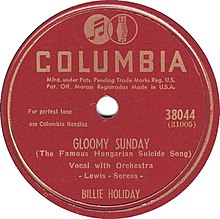Gloomy Sunday
Hungarian song / From Wikipedia, the free encyclopedia
Dear Wikiwand AI, let's keep it short by simply answering these key questions:
Can you list the top facts and stats about Gloomy Sunday?
Summarize this article for a 10 year old
"Gloomy Sunday" (Hungarian: Szomorú Vasárnap), also known as the "Hungarian Suicide Song", is a popular song composed by Hungarian pianist and composer Rezső Seress and published in 1933.

The original lyrics were titled "Vége a világnak" (The world is ending) and were about despair caused by war, ending in a quiet prayer about people's sins. Poet László Jávor wrote his own lyrics to the song, titled Szomorú vasárnap (Sad Sunday), in which the protagonist wants to commit suicide following his lover's death.[1] The latter lyrics ended up becoming more popular while the former were essentially forgotten. The song was first recorded in Hungarian by pop singer Pál Kalmár in 1935.
"Gloomy Sunday" was first recorded in English by Hal Kemp in 1936, with lyrics by Sam M. Lewis,[2] and was recorded the same year by Paul Robeson, with lyrics by Desmond Carter. It became well known throughout much of the English-speaking world after the release of a version by jazz and swing music singer Billie Holiday in 1941. Lewis's lyrics refer to suicide, and the record label described it as the "Hungarian Suicide Song". There is a recurring urban legend which claims that many people have taken their own lives while listening to this song, particularly Hungarians.[3]